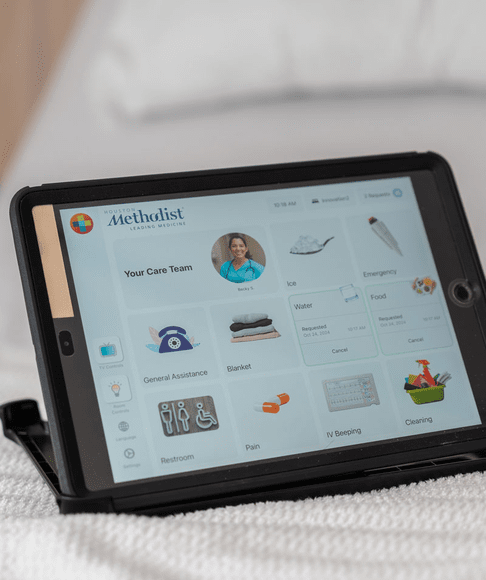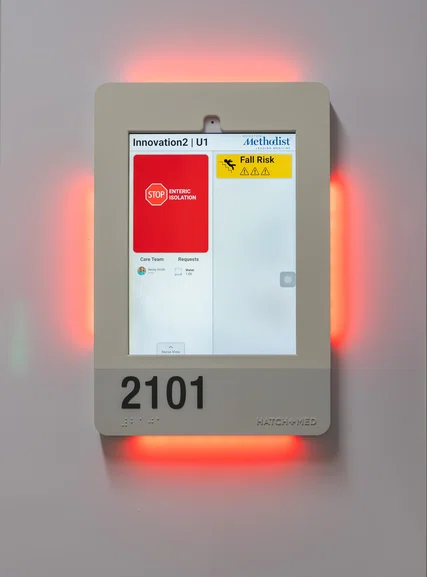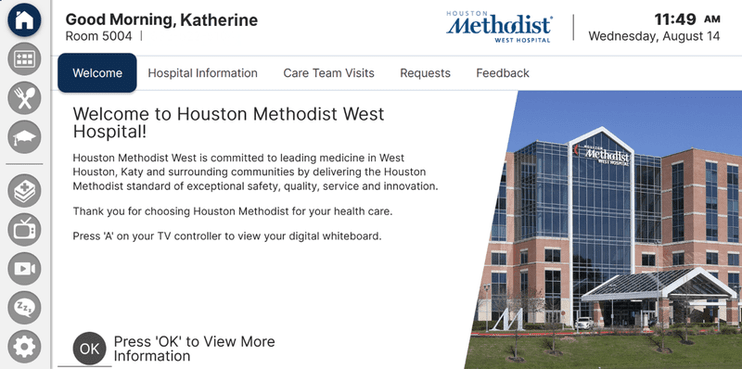© 2024. Houston Methodist, Houston, TX. All rights reserved.


In this
issue

WELCOME
NURSING SCIENCE

Robotic Tutor for Nursing

AI's Role in Nursing

Assessing the Knowledge and Attitudes of Registered Nurses About Artificial Intelligence in Nursing and Health Care
EDUCATION
PRACTICE

The Day in a Life of a Virtual Nurse and a Bedside Nurse

Enhancing Nursing Efficiency and Satisfaction with Smart Room Technology
PROFESSIONAL DEVELOPMENT

My Journey in Nursing: Into the Virtually Unknown

Engineered for Care: How Former Engineers Are Innovating Nursing
MAGNET
FROM OUR TEAMS

ABOUT DISCOVERN
PRACTICE
Enhancing Nursing Efficiency and Satisfaction with Smart Room Technology
By Pinky Shani, PhD, MSN, RN, NE-BC, Nurse Scientist
Houston Methodist West Hospital
By Pinky Shani, PhD, MSN, RN, NE-BC, Nurse Scientist
Houston Methodist West Hospital


Moreover, these smart room technologies significantly streamline communication between nursing staff and other healthcare providers. They allow for quicker updates and alerts, ensuring everyone involved in a patient’s care is on the same page. As noted in the McKinsey survey, nurses’ workload often includes tasks that, when optimized, lead to increased efficiency and improved patient outcomes.
By adopting smart room technology, hospitals enhance their operational efficiency and contribute to a higher level of job satisfaction among nursing staff. When nurses can efficiently manage their tasks through technology, they experience reduced stress, increased job fulfillment and a more significant opportunity to connect meaningfully with their patients. This is particularly important in nursing, where strong patient-nurse relationships are integral to providing compassionate, effective care. At Houston Methodist West, pre-and post-implementation questionnaires will be included to evaluate staff perceptions of the Vibe Health smart room platform, explicitly focusing on time management and awareness of patients’ needs. Additionally, self-report questionnaires will be used to evaluate patients’ perceptions of the Vibe Health smart room platform, with questions addressing awareness of the care team, pain management and mobility goals.
Organizational and nursing leadership culture plays a key role in the effectiveness of innovation. In addition, health informatics and digital health are two rapidly growing disciplines that are becoming more important to the sustainability of health services to our patients. Many organizations are overcoming collaboration and communication barriers with innovative technology partnerships. Barriers to technology implementation include a lack of nursing involvement in creating a vision for using the technology, inadequate resource availability, and workflow challenges (Brommeyer et al., 2023). Kroth et al. (2019) concluded in their study that stress and burnout related to electronic health records (EHR) are prevalent and may be associated with the local level of use. More issues were identified about clinical designs and work conditions such as workload and chaotic environments.

Patient care delivery and nursing efficiency remain at the heart of healthcare. Smart room technology has become increasingly important to healthcare as hospitals strive to deliver innovative care. An example of technological innovation is the digital whiteboard. The digital whiteboard is designed to alleviate the burden on nurses, minimizing the time spent on non-essential activities. It delivers real-time updates on patients’ health ensuring that patients remain informed and engaged throughout the care process. This transparency creates an empowering atmosphere where patients feel involved and confident in their treatment journey. Houston Methodist West Hospital is at the forefront of leading this innovative implementation among acute care patients and staff on 5E, a 32-bed acute care unit.
To assess the acceptability of the digital whiteboard, a survey will be automatically generated on the interactive TV system. Patients will be invited to complete this survey on the second day of their admission. The survey will evaluate patients' perceptions of the digital whiteboard focusing on pain management and mobility goals. Embracing smart room technology provides an innovative approach to streamlining workflows and improving patient outcomes while boosting nursing efficiency and satisfaction.
References:
Brommeyer, M., Whittaker, M., Mackay, M., Ng, F., & Liang, Z. (2023). Building Health Service Management workforce capacity in the era of Health Informatics and Digital Health – A scoping review. International Journal
Kroth, P. J., Morioka-Douglas, N., Veres, S., Babbott, S., Poplau, S., Qeadan, F., Parshall, C., Corrigan, K., & Linzer, M. (2019). Association of Electronic Health Record Design and use factors with clinician stress and Burnout. JAMA Network Open, 2(8). https://doi.org/10.1001/jamanetworkopen.2019.9609









